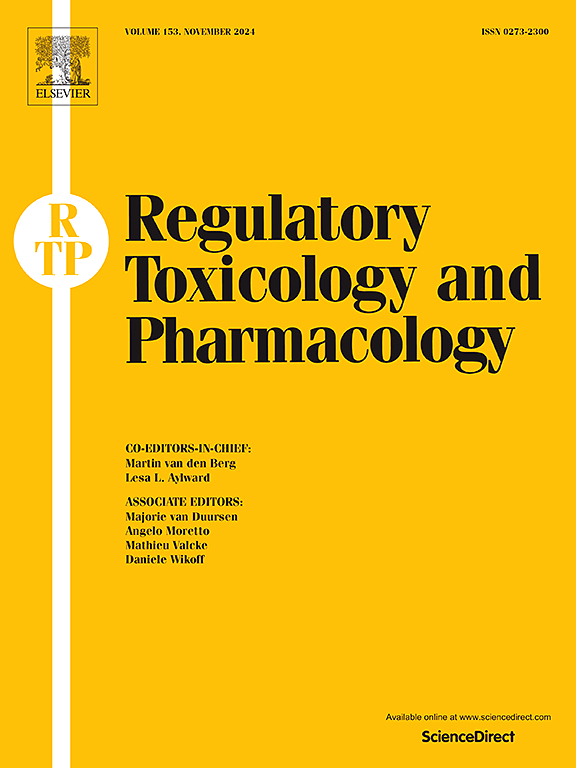在肿瘤治疗发展中减少非人类灵长类动物使用的策略:cd3双特异性。
IF 3.5
4区 医学
Q1 MEDICINE, LEGAL
引用次数: 0
摘要
作为IQ DruSafe/3R-TPS成员的制药公司,探索了在非临床药物开发中减少对非人灵长类动物(NHP)依赖的新方法。这些公司对用于治疗癌症的cd3双特异性抗体(BsAbs)的发现和开发过程中NHP在毒理学研究中的使用情况进行了调查。该调查的目的是收集cd3 - bsab进行的首次人体(FIH)启用(≤1个月)和II/ iii期启用(3个月)NHP研究的数据和案例研究实例。调查涉及研究设计要素,例如,当研究被认为有必要时,剂量组数量、动物数量/剂量组、恢复臂等。调查问题还集中在II期/ iii期研究的数据是否解决了在fih研究中未确定的患者风险,以及II期/ iii期研究是否影响了与临床开发相关的监管决策。调查结果使证据权重(WoE)方法得以发展,以评估II/ iii期毒性研究的效用,从而了解CD3 bsab的潜在安全风险,并为后期分子开发提供信息。研究设计优化和WoE方法都为减少NHP的使用提供了一条途径,而不会影响cd3 - bsab用于肿瘤适应症的非临床安全性评估。本文章由计算机程序翻译,如有差异,请以英文原文为准。
Strategies to reduce the use of non-human primates in the development of oncology therapeutics: CD3-bispecifics
Pharmaceutical companies, which are IQ DruSafe/3R-TPS members, explored novel ways to reduce reliance on non-human primate (NHP) use in nonclinical drug development. These companies conducted a survey on NHP use in toxicology studies during discovery and development of CD3-bispecific antibodies (BsAbs) for the treatment of cancer. The objectives of the survey were to collect data on and case study examples of both first-in-human (FIH)-enabling (≤1-month) and Phase II/III-enabling (3-month) NHP studies conducted with CD3-BsAbs. The survey addressed study design elements, e.g. number of dose groups, number of animals/dose group, recovery arms, etc. when a study is deemed warranted. Survey questions also focused on whether data from Phase II/III-enabling studies addressed patient risk that was not identified in FIH-enabling studies, and whether Phase II/III-enabling studies impacted regulatory decisions pertaining to clinical development. The survey findings enabled the development of a Weight of Evidence (WoE) approach to assess the utility of Phase II/III-enabling toxicity studies in understanding potential safety risks with CD3-BsAbs and informing later-stage molecule development. Both study design optimization and WoE approaches offer a path for reduced NHP use without compromising nonclinical safety assessment of CD3-BsAbs for oncology indications, as illustrated by several case examples.
求助全文
通过发布文献求助,成功后即可免费获取论文全文。
去求助
来源期刊
CiteScore
6.70
自引率
8.80%
发文量
147
审稿时长
58 days
期刊介绍:
Regulatory Toxicology and Pharmacology publishes peer reviewed articles that involve the generation, evaluation, and interpretation of experimental animal and human data that are of direct importance and relevance for regulatory authorities with respect to toxicological and pharmacological regulations in society. All peer-reviewed articles that are published should be devoted to improve the protection of human health and environment. Reviews and discussions are welcomed that address legal and/or regulatory decisions with respect to risk assessment and management of toxicological and pharmacological compounds on a scientific basis. It addresses an international readership of scientists, risk assessors and managers, and other professionals active in the field of human and environmental health.
Types of peer-reviewed articles published:
-Original research articles of relevance for regulatory aspects covering aspects including, but not limited to:
1.Factors influencing human sensitivity
2.Exposure science related to risk assessment
3.Alternative toxicological test methods
4.Frameworks for evaluation and integration of data in regulatory evaluations
5.Harmonization across regulatory agencies
6.Read-across methods and evaluations
-Contemporary Reviews on policy related Research issues
-Letters to the Editor
-Guest Editorials (by Invitation)

 求助内容:
求助内容: 应助结果提醒方式:
应助结果提醒方式:


